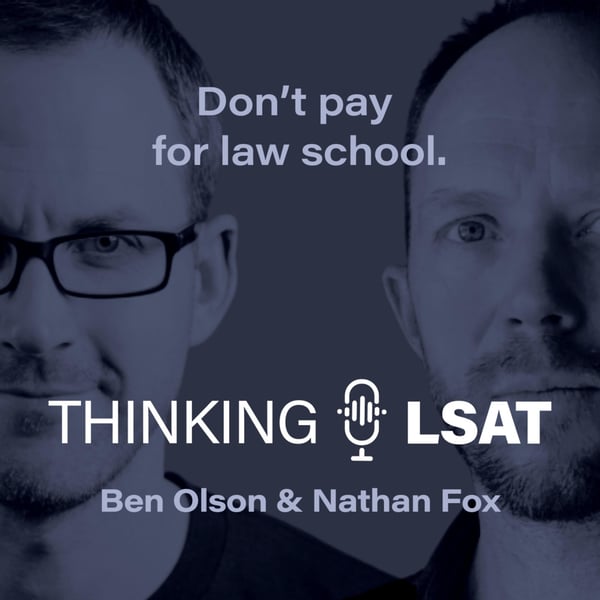Lemon Law Schools (Ep. 512)
Thinking LSAT
Nathan Fox and Ben Olson
4.8 • 868 Ratings
🗓️ 23 June 2025
⏱️ 67 minutes
🧾️ Download transcript
Summary
Law School Lemons & LSAT Ceilings
Ben and Nathan discuss how law school admissions resemble a “market for lemons,” where students face steep information asymmetries. They highlight tools like the Scholarship Estimator and 509 reports that help applicants manage expectations and avoid overpaying. While there are several ways to strengthen an application, none are as effective as a strong LSAT and GPA.
Watch Episode 512 on YouTube
0:26 – Law School Lemon Law
Demon student Luca applies the “market for lemons” concept to law school admissions, emphasizing the information gap between applicants and schools. Ben and Nate note that schools often string applicants along without providing transparent pricing. Tools like 509 reports and the Scholarship Estimator help narrow this gap by showing what students might actually pay. Despite the added time and cost, applying broadly remains key to determining your market value.
LSAT Demon Scholarship Estimator
17:36 – Getting In Isn’t the Goal
Ben and Nathan discuss a Reddit post that shared an email in which the University of Oklahoma’s law school advised an applicant to raise their LSAT score. Some were outraged, but the data supports it—Oklahoma’s median LSAT is 160. They caution against accepting offers where you just meet the medians. Barely squeaking in often means overpaying.
23:31 – Announcements
August LSAT Registration closes June 26th. See all registration details at lsat.link/dates.
25:22 – Holistic Applications
Extracurriculars and soft factors help, but only after your LSAT and GPA are competitive. Athletics, internships, and work experience can strengthen your application, but they won’t offset weak numbers.
29:48 – Tips from Departing Demons
Recent Demon students share what worked for them. Asma recommends “having a conversation with the test” to stay mentally engaged rather than going on autopilot. Another student, LT, shares that they ultimately decided not to pursue a JD, showing that sometimes the best move is to walk away.
34:23 – What’s My Ceiling?
Seth asks if massive LSAT gains—30 or even 40 points—are possible. The guys say yes, but they stress not to rush toward specific schools or deadlines. Instead, slow down, focus on one question at a time, and aim for a minimum of 160. Below that, law school might not be the right investment.
39:21 – Personal Statement Gong Show
Amy feels that the Personal Statement Gong Show has given her a great idea of what not to do. Now, she wants to know what makes an elite personal statement. Ben and Nathan highlight some essential lessons using a personal statement from the Gong Show’s first celebrity contestant, Demon team member Stefan.
1:04:32 - Word of the Week - Aegis
[The memoirs] written by royalists, who opposed the Revolution, were published under the monarchy’s aegis.
Get caught up with our Word of the Week library.
Transcript
Click on a timestamp to play from that location
| 0:00.0 | I said no. |
| 0:01.0 | Just LSAT. |
| 0:02.0 | It's my favorite fun fact about Ben Olson. |
| 0:04.2 | His license plate says only LSAT. |
| 0:06.7 | That's it. |
| 0:11.1 | Hello and welcome to episode 512 of the Thinking ElSat podcast. |
| 0:18.8 | I'm Ben Olson. |
| 0:19.9 | With me is Nathan Fox. We're the co-founders of Elsaid Demon.com and the Elsaid Demon Daily podcast. Let's jump into this. We have an email from Luca. The subject line is Law School Lemon Law. |
| 0:33.5 | Hi, Ben Nathan and the Elsaat Demon team. My name is Luca, and I'm a big fan of the Demon podcast's website and book. I've especially enjoyed the recent episodes where you've compared law schools to deceptive car salespeople. I'd like to build on that analogy using the scholarly article, The Market for Lemons, Quality Uncertainty and the Market Mechanism by George A. Ackrloff, a UC Berkeley economics professor and Nobel laureate. |
| 1:02.9 | Akrolough explains that sellers often have much more information about their products than buyers. |
| 1:08.3 | Some of these products, specifically low-quality used cars with hidden issues, |
| 1:13.1 | are referred to as lemons. Because of the information asymmetry, buyers often can't distinguish |
| 1:19.3 | between high-quality and low-quality cars, leading them to overpay or make poor purchasing |
| 1:25.2 | decisions. Is it fair to say that, at least at certain price |
| 1:29.7 | points, many law schools could be considered lemons? At many institutions, students take on six-figure |
| 1:37.2 | debt for a degree that doesn't deliver the job outcomes necessary to repay it. Like a car buyer stuck |
| 1:43.0 | with mounting repair bills from a lemon, these students |
| 1:46.2 | are stuck with compounding interest on loans due to a fundamentally flawed product. As you've pointed |
| 1:52.0 | out in the podcast, law schools use third-party consultants and massive data sets to optimize their |
| 1:57.7 | marketing and admission strategies. These strategies can mislead |
| 2:01.3 | prospective students into overestimating the value of certain law degrees. Despite the availability |
| 2:06.9 | of ABA data, many students are still persuaded to attend overpriced underperforming schools, |
... |
Please login to see the full transcript.
Disclaimer: The podcast and artwork embedded on this page are from Nathan Fox and Ben Olson, and are the property of its owner and not affiliated with or endorsed by Tapesearch.
Generated transcripts are the property of Nathan Fox and Ben Olson and are distributed freely under the Fair Use doctrine. Transcripts generated by Tapesearch are not guaranteed to be accurate.
Copyright © Tapesearch 2025.

